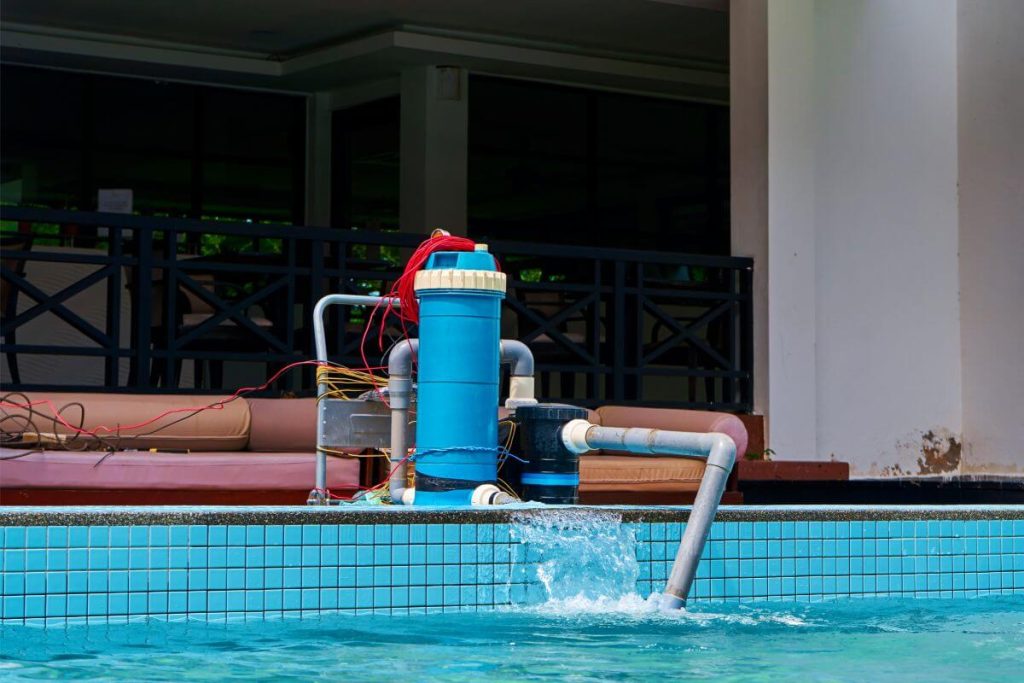Pool care is a daily process that becomes part of your routine. The amount of time pool owners spend on maintenance can vary from 30 minutes to 2–3 hours per day due to different pools’ sizes and chemicals’ levels. What if you could automate this process and provide yourself with more free time?
One way to make it real is to own an automatic pool chlorinator. In this article, we will describe to you what a pool chlorinator is, compare the four types of chlorinators with the best models, compare them, and answer the most burning questions.
Best Pool Chlorinators Comparison Table
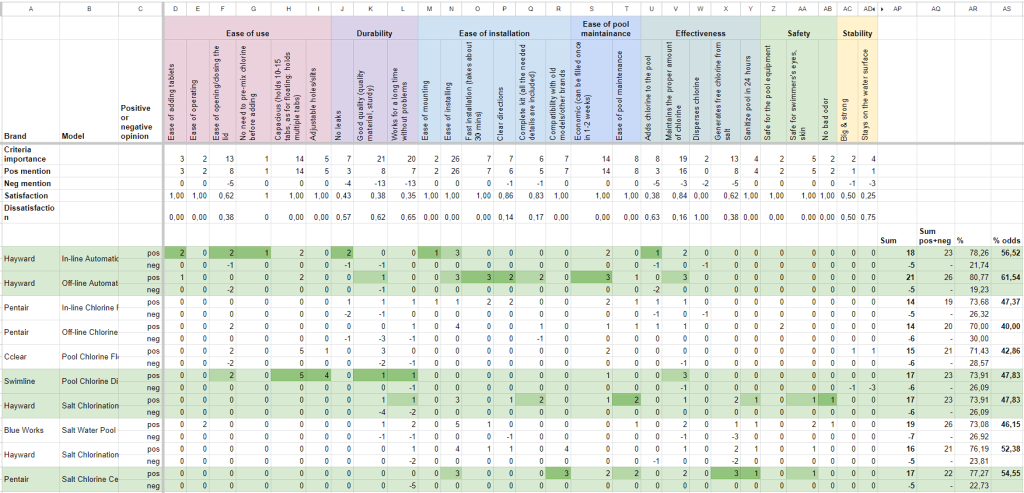
Why is our review unique? First, we don’t advertise products. Secondly, the products in our review are the best according to . To perform it, we:
- Collected 10+ pool chlorinators with a rating of 4+ on Amazon;
- Interviewed 200+ users;
- Analyzed the responses and identified 27 quality criteria;
- Evaluated the responses according to quality criteria and ranked the top 4 pool chlorinators.
| Characteristics | What makes it the best? | |
| Automatic Chlorinators | ||
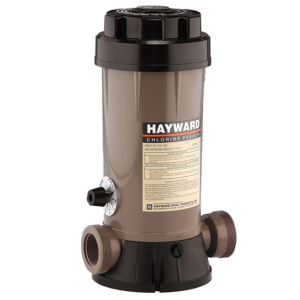 Hayward In-line Automatic Chemical Feeder Winning category The best in-line chlorinator | Amazon rating: 4.7 Material: Plastic Pool capacity: Up to 40,000 gallons Chemical Capacity: 9 lbs. (up to 11–13 3-inch tabs) Kit: Mounting base | The easiest to use – #1 in this category The sturdiest – the only item in which users mention the absence of leaks The easiest lid to open – push the tab under the lid to spin it off Jump to the detailed review |
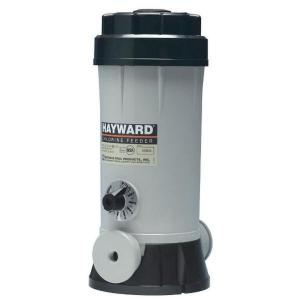 Hayward Off-line Automatic Chemical Feeder Winning category The best off-line chlorinator | Amazon rating: 4.6 Material: Plastic Pool capacity: Up to 40,000 gallons Chemical Capacity: 9 lbs. (up to 11–13 3-inch tabs) Kit: Mounting base | The most economical – one chlorinator refill lasts 2+ weeks The clearest directions – 40% of users report that they hadn't got any problems with instructions The easiest to install – #1 in this category Jump to the detailed review |
| Floating Chlorinator | ||
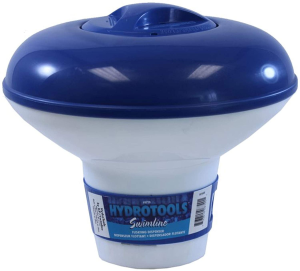 Swimline Pool Chlorine Dispenser Winning category The best floating chlorinator | Amazon rating: 4.4 Material: UV-resistant plastic Pool capacity: Up to 10,000 gallons Chemical Capacity: 5 3-inch or 50 1-inch tabs Kit: Top twist lock cap | The most durable – #1 in this category The most capacious – holds 5 3-inch tabs, which is 2 tabs more than #2 The easiest to adjust chlorine release level – has 4 levels of chlorine release speed Jump to the detailed review |
| Salt Water Chlorinators and Replacement Cells | ||
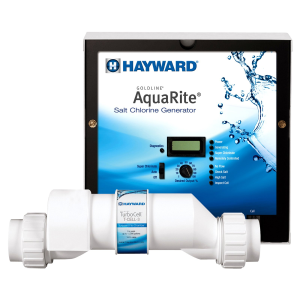 Hayward Salt Chlorination System Winning category The best saltwater chlorinator | Amazon rating: 4.6 Material: Plastic Pool capacity: Up to 40,000 gallons Chemical Capacity: 1 cell generates up to 1.4 lbs. per day Kit: 1 chlorination cell, 1 station, and flow sensor | The easiest pool maintenance – #1 in this category because it wins in 50% of the criteria The most reduced odor – 20% of users report that it hasn't got any chemical odor The fastest pool sanitizing – makes your pool water crystal clear in 12–24 hours Jump to the detailed review |
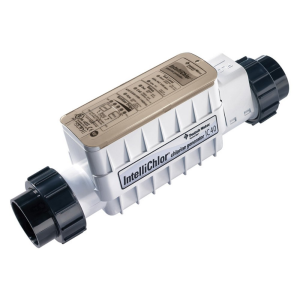 Pentair Salt Chlorine Cell Winning category The best saltwater chlorinator cell | Amazon rating: 4.5 Material: Plastic Pool capacity: Up to 40,000 gallons Chemical Capacity: 1 cell generates up to 1.4 lbs. per 24 hours Kit: 1 chlorination cell | The most effective chlorine cell – #1 in this category The most effective sanitizing – generates chlorine 20% more available chlorine The most universal – compatible with old chlorination or other brands' stations Jump to the detailed review |
What Is a Pool Chlorinator?
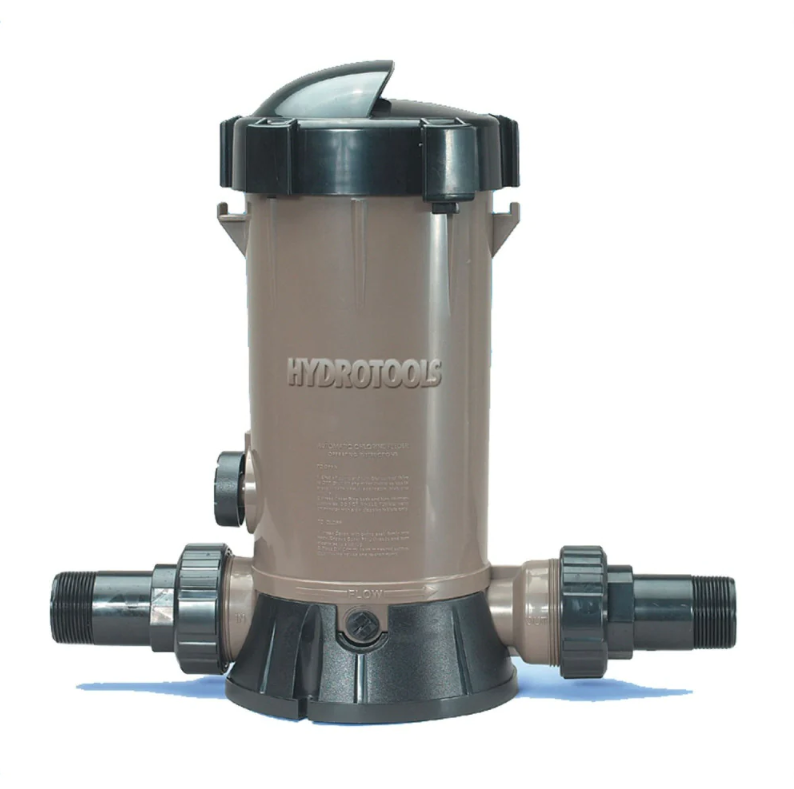
A pool chlorinator is a device that automatically releases chlorine into your pool and avoids sediment buildup. We can distinguish four main types, depending on how the chlorine is installed and generated: in-line automatic, off-line automatic, floating dispenser, and saltwater generator. You will learn more about their differences in the next paragraph.
In general, users we interviewed said that pool chlorinators make the pool sanitizing process much easier, as they no longer need to pour it manually:
“Keeping the pool chlorinated properly was a chore if not a pain, but now I only should add tabs to the chlorinator to keep my chlorine levels.”
— Geewiz, WA
Moreover, this device allows you to place tablets and forget about chlorination for several weeks:
“Before leaving for vacation, I added 12 tablets to the pool. After 16 days, it consumed 7 tablets, and the pool seems to be in good condition. The chlorine levels are good with no signs of algae.”
— Kevin Spence, NV
Types Of Pool Chlorinators & Their Differences
As we noted earlier, there are four types of pool chlorinators. They differ fundamentally in chlorine supply, installation, chlorine/bromine consumption, etc. Below, you can check out a detailed comparison.
| Type |  In-line Automatic Chemical Feeder |  Off-line Automatic Chemical Feeder |  Chlorine Dispenser |  Chlorination System |
| Principle of work | Tabs or sticks are placed in a chamber. Water penetrates the floater, so the tabs/sticks dissolve. Also, they have adjustable holes/slits to control released chemicals. | Salt is poured to the water, then the salt water enters the chlorination cell, where a chemical reaction releases chlorine gas, which turns the water into hypochlorous acid, a substance that sanitizes the pool. | ||
| Installation | Installed into the plumbing system after the filter and heater and worked by using the water flow. | Installed outside the plumbing system and worked by using a small pump. | No installation is needed, floats on the water’s surface. | Installed in the plumbing system, after the filter and before any other equipment. |
| Pool volume | Up to 10,000 gallons | Up to 40,000 gallons | ||
| Capacity | Up to 5 3-inch tabs | Do not need to put any chemicals inside | ||
| The best for | People who want to automate the process of adding chlorine. | People who want to automate the process of adding chlorine BUT are unable to install chlorinators to the plumbing system (e.g., aboveground pool or unmodifiable plumbing). | People who own small pools (< 10,000 gallons), don’t want to spend x10 price for in-line/off-line chlorinators or are unable to install them. | People with sensitive skin or some contraindications for chlorine/bromine use, people who don’t want to use chemicals. |
| Price | app. $100 | app. $100–$140 | app. $10–$20 | app. $1200–$1900 |
Best Pool Chlorinators
We have got acquainted with the main pool chlorinator types, and each reader, perhaps, has decided on the type. Therefore, we suggest jumping straight into the best pool chlorinators, which we have identified by interviewing over 500 users and assessing them using a methodology.
Hayward In-line Automatic Chemical Feeder – Best In-line Chlorinator
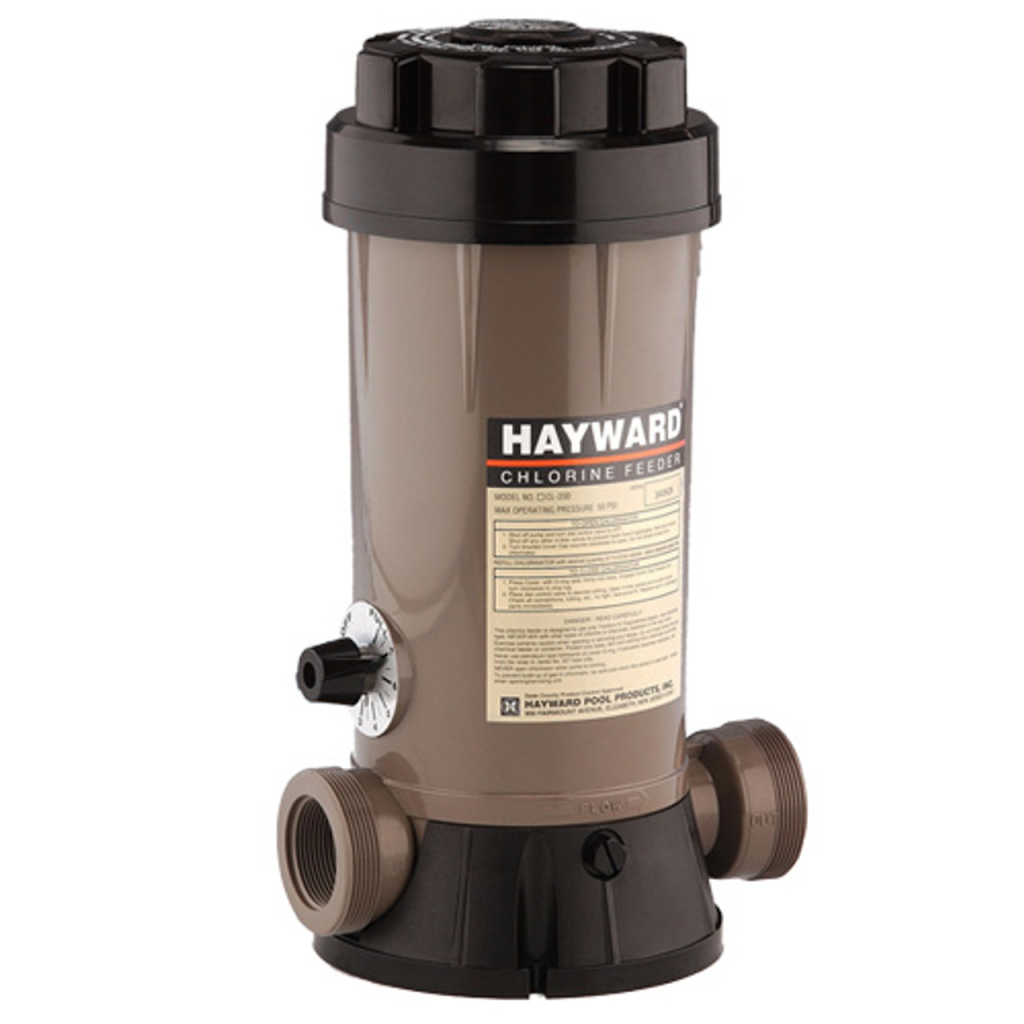
The best in-line chlorinator
Hayward In-line Automatic Chemical Feeder is the best in-line pool chlorinator because it is the easiest to use, as it won 3 out of 6 criteria: ease of adding tablets, opening/closing a lid, and providing the ability not to pre-dissolve chlorine. The first two indicators are closely related because the absence of a proper lid will complicate adding tablets. Here’s what users are saying:
“With minimal effort, I added the tab under the lid and subsequently twisted off the lid with remarkable ease.”
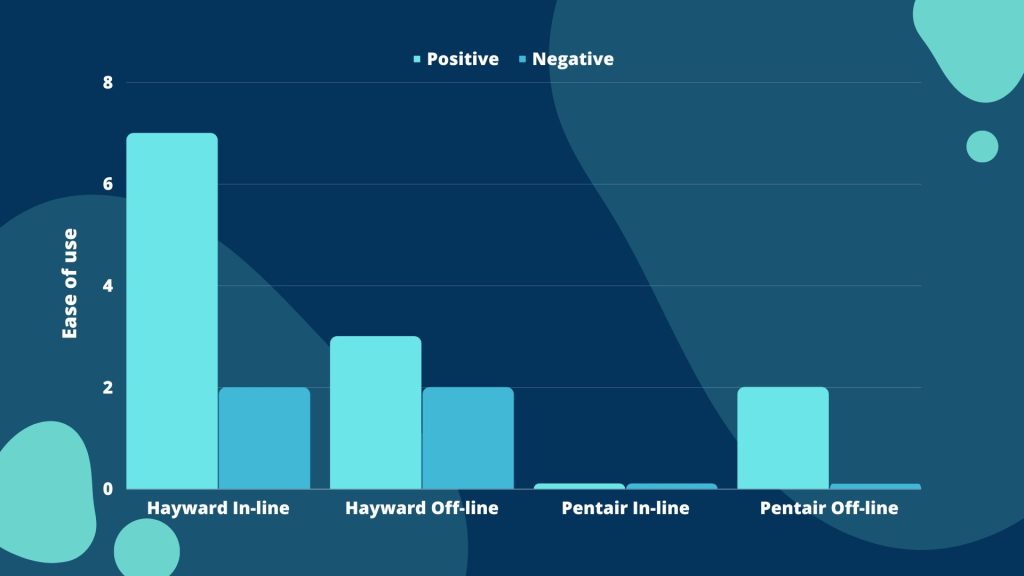
Thus, the Hayward In-line Automatic Chemical Feeder, unlike the Pentair In-line Chlorine Feeder, doesn’t need a lid opener. However, users also admit that the lid closes tight enough that there are no leaks:
“Ease of adding tablets and not worrying about leaks”.
Most importantly, this in-line pool chlorinator can effectively maintain proper chlorine levels, as 40% of users have positive feedback.
Overall, Hayward In-line Automatic Chemical Feeder is rated #2 among all rated chlorinators and #1 among in-line ones. So, if you need to automate the chlorination process, and you can build that into a plumbing system, you found what you were looking for!
Pros
- The ease of adding tabs – #1 because 40% of users admit it, which is up to 40% more than others
- The easiest lid to open/close – #1 because 40% of users admit it, which is up to 20% more than others
- Large capacity – holds up to 13 3-inch chlorine tablets, which is two more than the #2 in-line chlorinator
- High efficiency – up to 20% more users admit its efficiency in maintaining the proper chlorine levels
Cons
- You should separately buy two unions because otherwise, you won’t be able to connect it
Hayward Off-line Automatic Chemical Feeder – Best Off-line Chlorinator
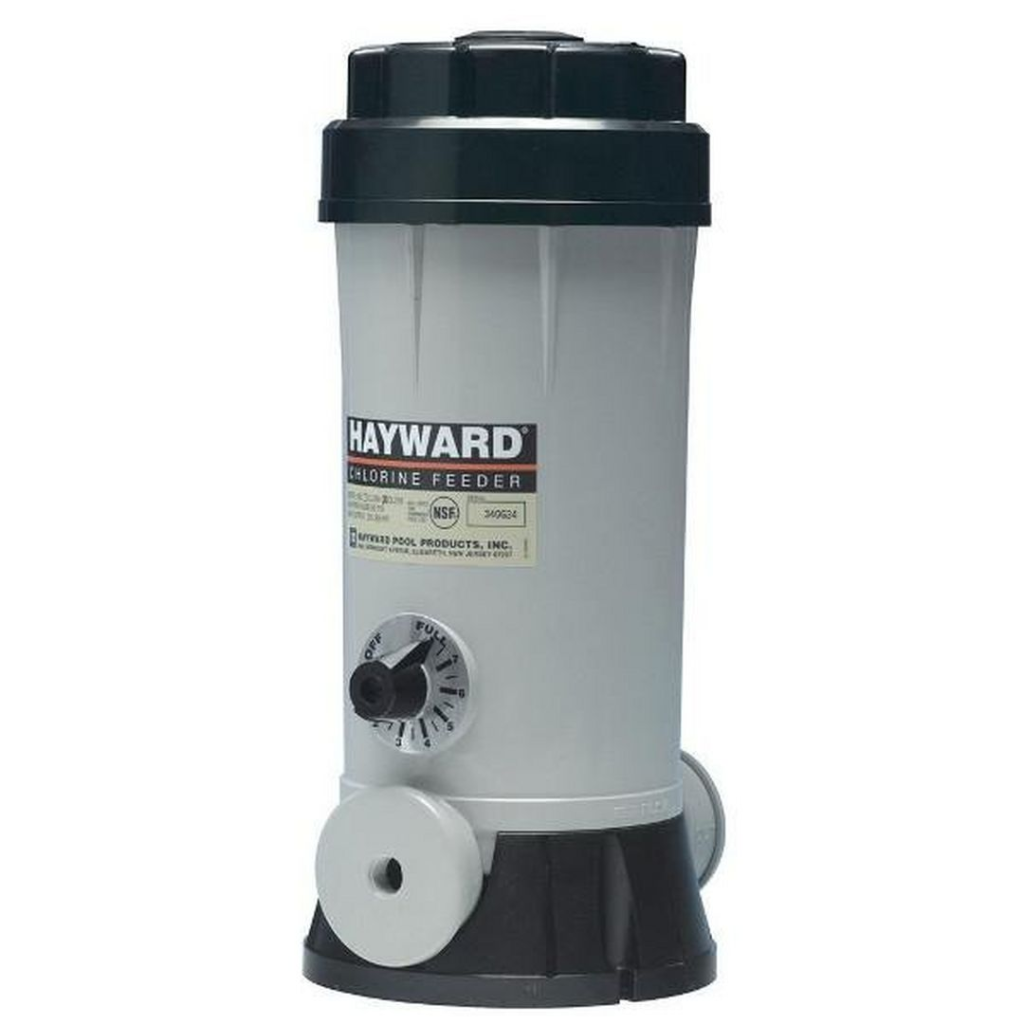
The best off-line chlorinator
Hayward Off-line Automatic Chemical Feeder is the best off-line chlorinator. because it has the easier installation relative to in-line. Moreover, Hayward is way better than other off-line chlorinators, which makes him an absolute winner. We know that installation is a one-time activity. However, installation can be a key criterion, as you need to deal with plumbing.
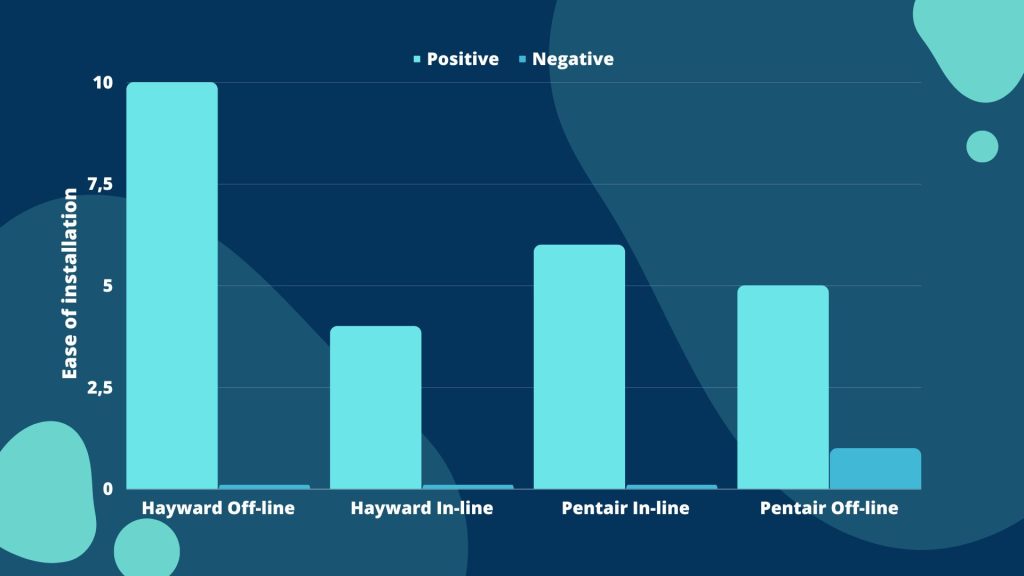
Moreover, the Hayward Off-line Automatic Chemical Feeder is rated as the best for maintaining chlorine levels, with over 60% positive feedback:
“Added chlorine tabs, and it’s holding levels great!”
Also, users will note the high efficiency of this device because one refueling is enough for about two weeks, and this allows you to use fewer chemicals:
“This chlorine feeder has already paid for itself in the 1st season of use because I actually used less chlorine, and I no longer needed to add a separate algaecide.”
Overall, Hayward Off-line Automatic Chemical Feeder is the highest rated among all the chlorinators. So, if you don’t want or can’t put a chlorinator in the plumbing, you found what you were looking for!
Pros
- The most capacious off-line chlorinator – holds two more 3-inch tabs than the #2 model
- The most economical – one refill lasts for 2–3 weeks, which is 15% more than the #2 model
- The fastest installation – takes 15 mins to install, which is up to 75% faster than other
- The clearest directions – up to 40% more users admit the instructions are easy to understand
Cons
- Some users state that the lid is challenging to open/close. Therefore, you may consider buying a lid opener
Swimline Pool Chlorine Dispenser – Best Floating Chlorinator
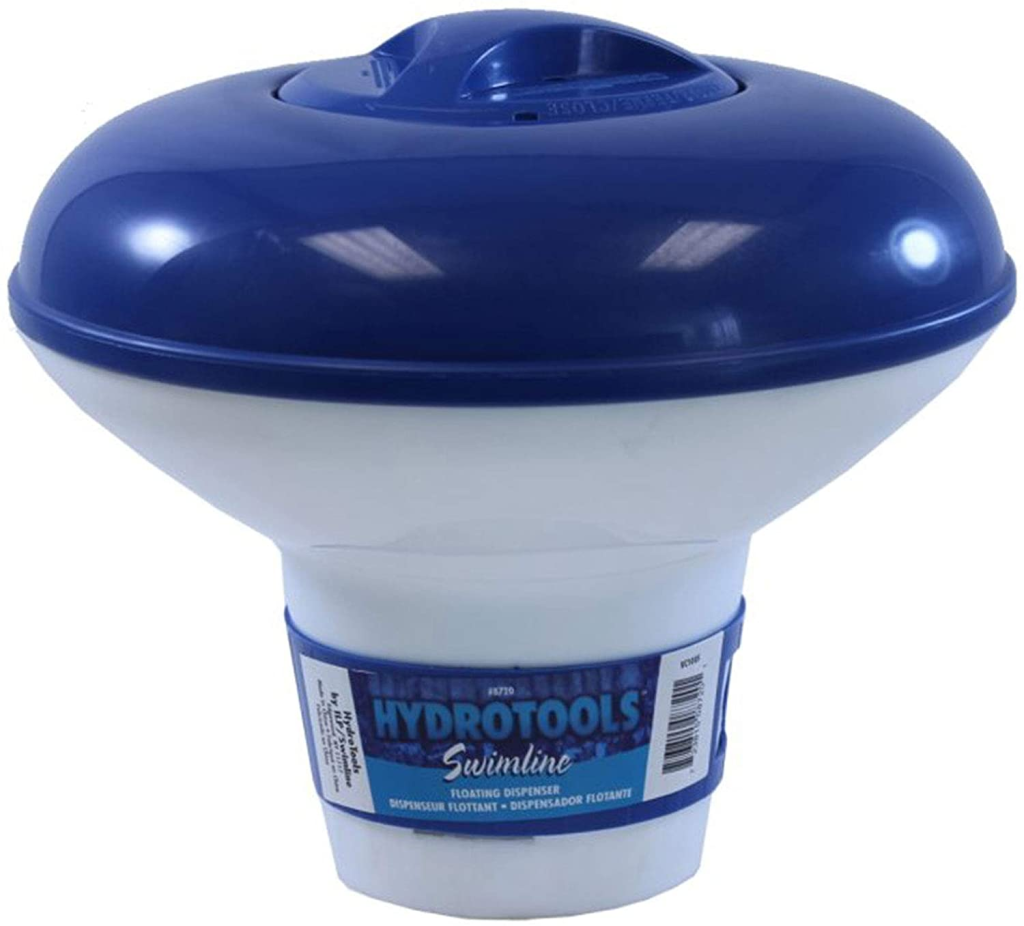
The best floating chlorinator
Swimline Pool Chlorine Dispenser is the best floating chlorinator. First, its durability is rated as the best, since it is #1 in two of the three criteria in this category. About 30% of users admit that this dispenser is made of quality and sturdy materials.
“Even after six months of use, it appears to be like a new one because the color doesn’t fade, and the performance isn’t changed.”
The chart shows that Cclear Floating Dispenser has a higher score, but its users are three times more likely to complain about poor materials and fragility. This item cannot be a winner, as you have a 50% chance of being left with a broken chlorinator.

Also, almost 80% of users note the convenience of using the Swimline Pool Chlorine Dispenser due to the customizable holes. A simple yet robust mechanism allows you to choose one of four chlorine release modes to fine-tune chemical levels.
Overall, Swimline Pool Chlorine Dispenser is #1 among floating chlorinators and worth your consideration if you are looking for a budget option for automating chlorine dispensing. It has the largest capacity and can handle up to 10,000 gallons.
Pros
- The most durable – has no leaks, according to user reviews, while the #2 model has approximately 40% negative comments on this criterion
- The most effective chlorine release – 60% of users state that it releases chlorine without any problems
- The largest capacity – almost 100% of users admit that it holds the most tabs (up to 5 3-inch tabs)
- Ease of use – up to 80% of users state that this chlorinator has easy-to-adjust holes/slits
Cons
- It can treat up to 10,000 gallons, so, for the larger pool, you may need to buy more units
Hayward Salt Chlorination System – Best Saltwater Chlorinator
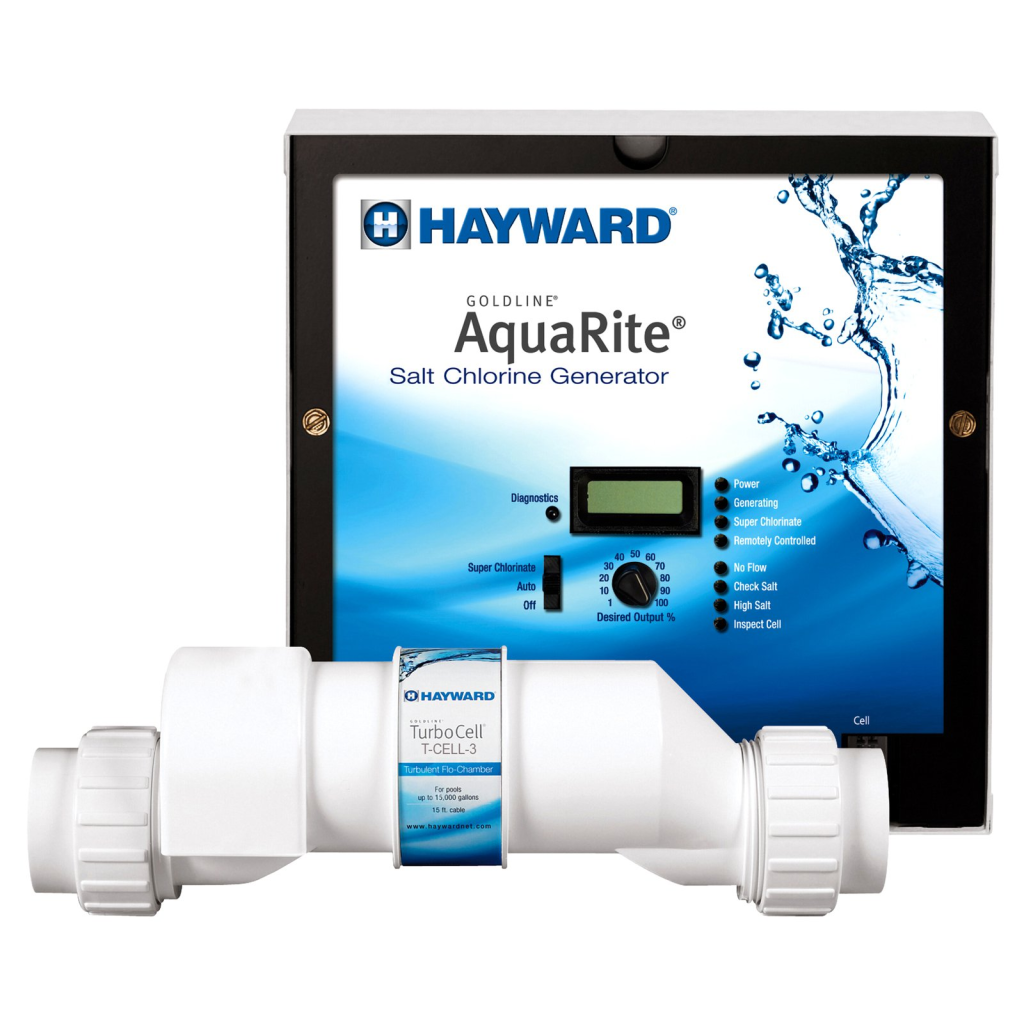
The best saltwater chlorinator
Hayward Salt Chlorination System is the best saltwater chlorinator, since it’s #1 among others. What makes it the best? Firstly, you can forget the difficulties of pool maintenance. More than 40% of users, the highest among all other types of chlorinators, say that their life will become easier.
“We added eight bags of salt to our 30,000-gallon pool when opening the pool and have had little to no work done since.”
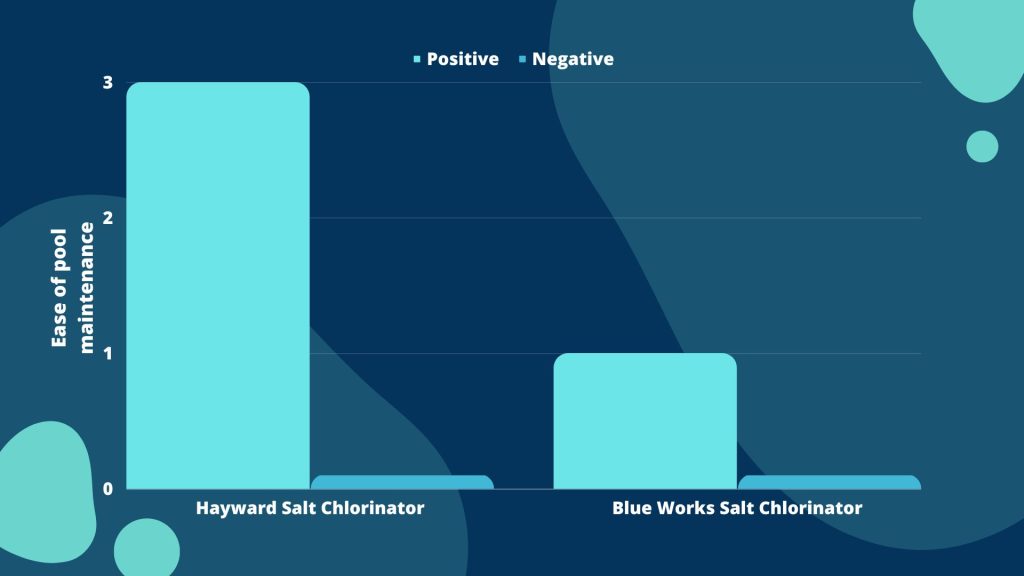
One disadvantage of saltwater systems is their high cost (up to 12 times more than in-/off-line chlorinators). However, users note that these devices have a payback period of 1–2 years because of the chlorine cost increase.
“We got our money back after two years of use.”
Perhaps the crucial advantage of the Hayward Salt Chlorination System is its safety for the skin and eyes. More than 20% of users note the following:
“No bad odor, no bad taste, it doesn’t burn your eyes, and the water is less salty than tears.”
Overall, Hayward Salt Chlorination System is #1 among saltwater generators. Its disadvantage is offset by the fast payback period and long service life, as they last 6–8 years.
Pros
- The safest chlorination – no taste, no smell, easy on skin and eyes
- The easiest pool maintenance – up to 40% of users, which is 20% more than others, state that it makes pool maintenance easier
- Complete kit – contains chlorination station, cell, and flow sensor
- Can sanitize pools up to 40,000 gallons, which is up to 4 times more than others
Cons
- You may need to purchase unions separately, as they aren’t supplied in the kit
Bonus: Pentair Salt Chlorine Cell – Best Saltwater Chlorinator Cell
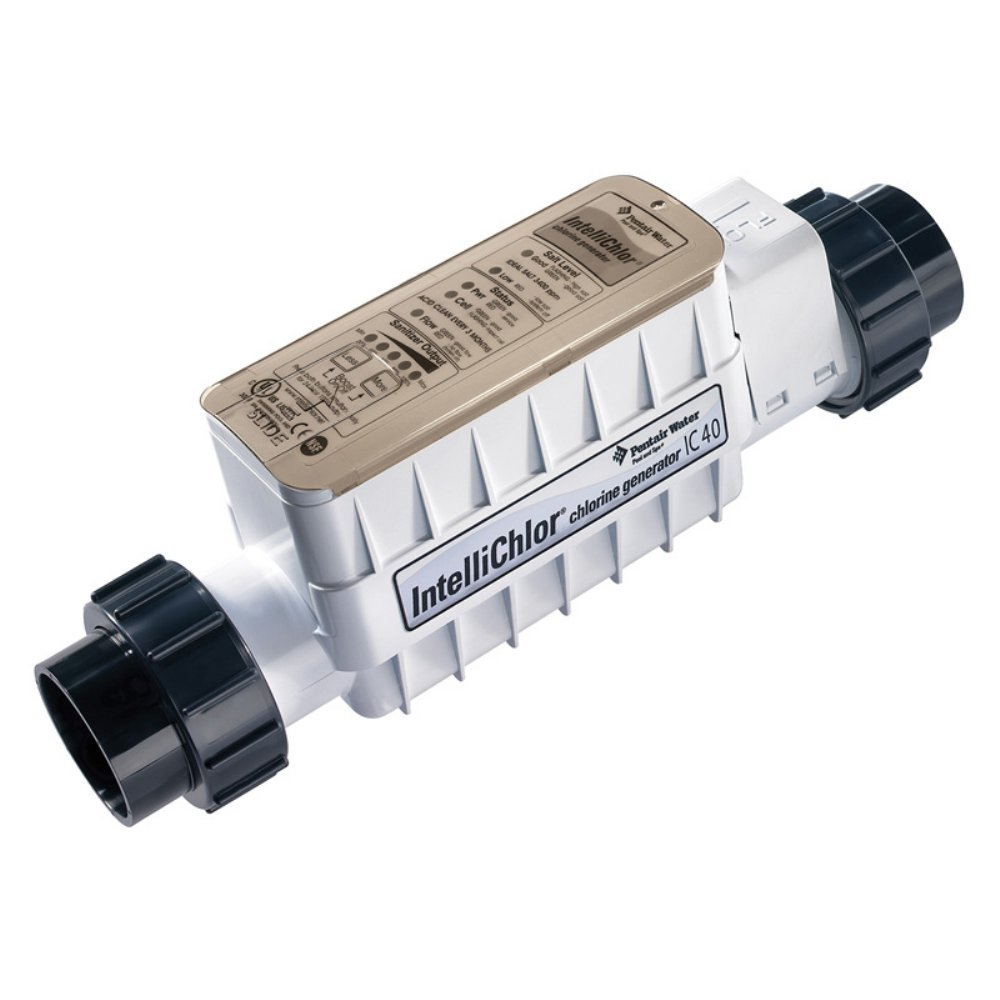
The best saltwater chlorinator cell
Pentair Salt Chlorine Cell is the best chlorination cell, a component of the saltwater system. It has the highest efficacy score among others, since it’s the winner in 2 out of 5 criteria. More than 60% of users admit that this device effectively sanitizes the pool, and 20%+ of users note the fast rate of this process.
“It started generating immediately and has my levels back up to normal quickly.”
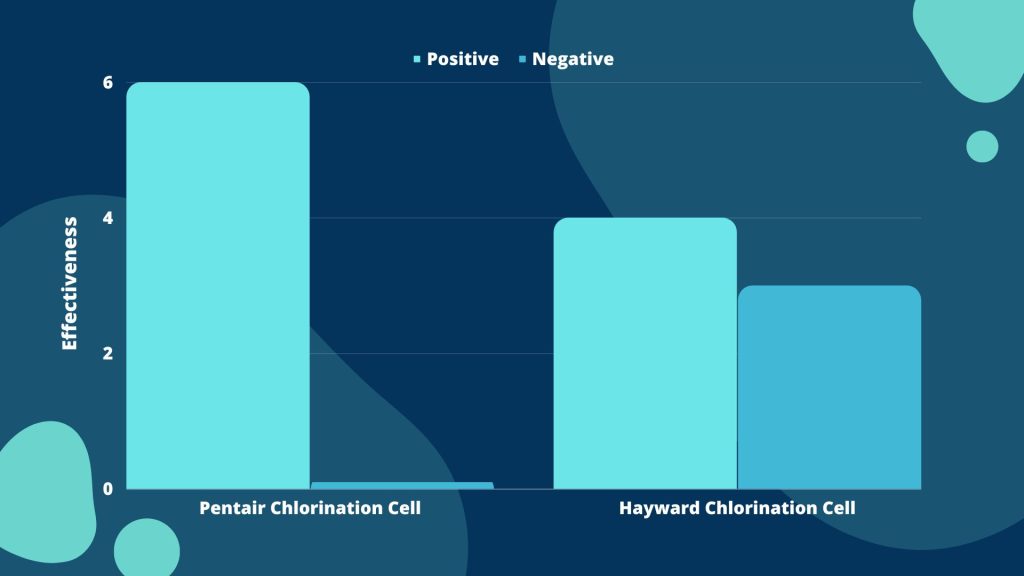
Also, the Pentair Salt Chlorine Cell is very easy to install. Almost 60% of users, which is the #1 indicator among all chlorinators, note this. Moreover, this cell is compatible with old Pentair systems and systems from other brands.
People with color blindness can use it without problems. Additionally to color indicators that show the chlorine level, this cell has labels under them. Therefore, no one will have difficulties with recognition.
Overall, Pentair Salt Chlorine Cell is #1, so if your cell is down, but the chlorination station is working, you found what you were looking for.
Pros
- The most universal – 60% of users state that it is compatible with old models and other brands, which is up to 20% more than others
- The most effective chlorine generation from salt – up to 20% more users state that it generates chlorine from the salt of different brands
- Fast sanitizing – makes your water crystal clear in 12–24 hours like Hayward Salt Chlorination System
- Easy to install – 60% of users state that they installed it without additional help
Cons
- It is a bit pricey because it costs 63% of the whole new chlorine station, without which it can’t work
Do I Need A Pool Chlorinator?
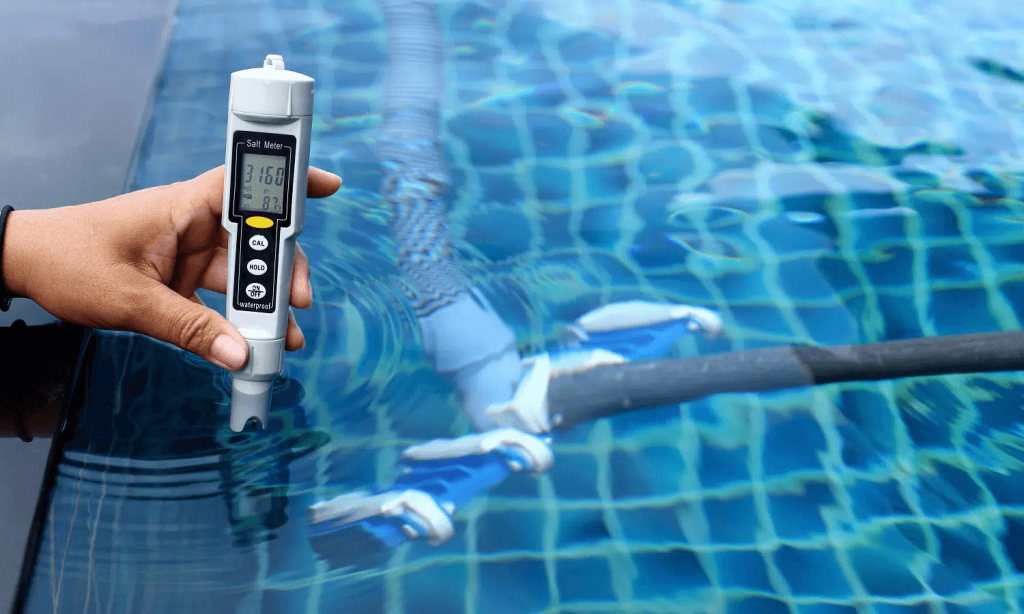
A pool chlorinator is not a mandatory option for your pool. However, you can make life easier if you belong to one of the following groups.
- Busy owner. An automatic chlorinator is a solution if you don’t have the time to regulate chlorine levels. It may take 1–2 days to find the proper chlorinator settings.
- Guest pool owner. If you have a house/territory with a pool for rent, you will hardly have the opportunity to visit it daily. Therefore, an automatic chlorinator will be helpful, as it can autonomously sanitize it.
- Large pool owner. Maintaining proper chlorine levels in a large pool can be difficult, as you should add more chemicals, which will take longer. With an automatic chlorinator, you need to refill the feeder.
- Extra point: owner with sensitive skin. You can use the salt water chlorination system.
Summary
A pool chlorinator is not a mandatory option for your pool, but under certain conditions, it will become an integral part of it. If you are very busy, own a guest house with a pool, large pool, or have sensitive skin, this is the #1 choice for you.
However, if you are not in the above-mentioned groups, you may want to consider purchasing a pool chlorinator, as it reduces your maintenance time. If you still have not decided on the type of device, we suggest you get acquainted with the best pool chlorinators.
FAQ
💲 How much does a pool chlorinator replacement cost?
It is based on the pool chlorinator type. If you have an in-/off-line one, it will cost you $100–$150. As for the dispenser and saltwater generator, it will cost $10–$20 and $1,200–$1,900 respectively.
🕔 What is a lifespan of pool chlorinators?
According to user reviews, in-/off-line chlorinators last for 5–7 years, and saltwater chlorinators last for 6–8 years.
⌛️ How long should a chlorinator run per day?
It depends on weather and water conditions. But, generally, you should run a chlorinator for 4–8 hours.
❄️ Does a pool chlorinator work in winter?
You can run a pool chlorinator in winter, but you should keep in mind that chlorine levels may be lower. Therefore, you should constantly check it.
⏲ How often do I need to turn on a pool chlorinator?
You can use a pool chlorinator daily to keep your chlorine levels. However, you should keep in mind to fill the feeder with tabs.
🧂 Do I need salt for a pool chlorinator?
For in-/off-line chlorinators and floating dispensers, you shouldn’t use salt, since they’re filled with chlorine and bromine tabs. The only chlorinator you need salt in is a saltwater system.


